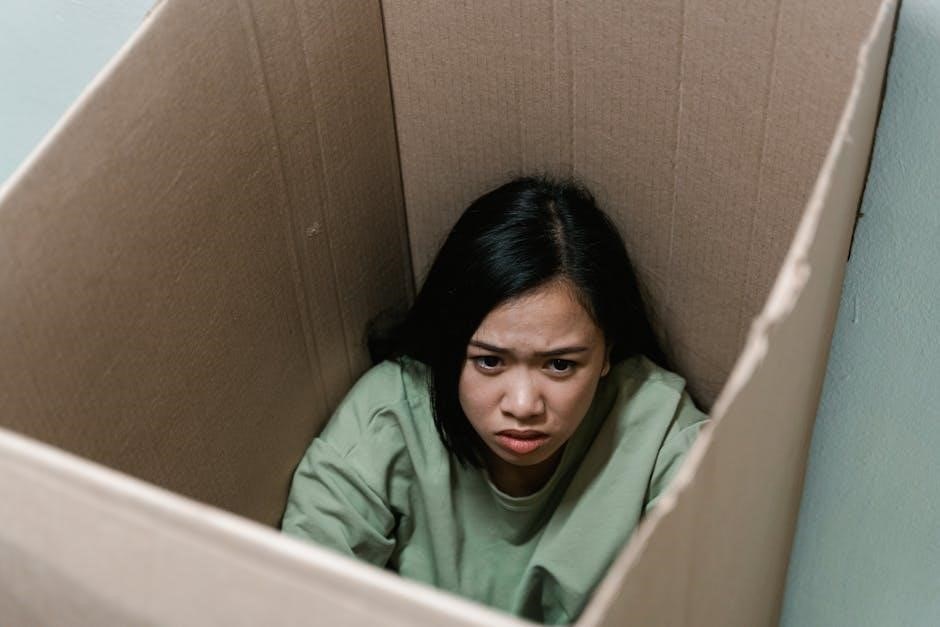Welcome to the Confined and Horny Guide, your ultimate resource for navigating sexual frustration in confined spaces․ This guide offers practical advice, strategies, and insights to help you manage desire, maintain emotional well-being, and foster healthy relationships while confined․ Whether you’re dealing with isolation, relationship challenges, or personal struggles, this guide is here to empower you with knowledge and solutions․

Understanding the Causes of Sexual Frustration in Confinement
Sexual frustration in confinement often arises from biological, environmental, and emotional factors․ Hormonal changes, lack of privacy, and pent-up desire can intensify feelings of horniness and restlessness․
2․1 Biological Factors Contributing to Horniness
Hormonal fluctuations, particularly testosterone and estrogen levels, significantly influence sexual desire․ Prolonged confinement can heighten biological responses, increasing arousal due to restricted release mechanisms․ The brain’s neurotransmitters, such as dopamine and serotonin, also play a role in regulating libido, often intensifying feelings of horniness in confined environments․ These biological factors, combined with limited outlets for physical expression, can exacerbate sexual frustration, making it essential to address them proactively․
2․2 Environmental Factors Affecting Libido
Environmental factors significantly impact libido in confined spaces․ Limited personal space, lack of privacy, and proximity to others can heighten sexual tension․ Stress from confinement may suppress or intensify arousal, depending on individual responses․ Additionally, the absence of stimulating environments or opportunities for intimacy can alter libido levels․ These external conditions often create a unique dynamic, where the confined environment either fuels desire or dampens it, depending on personal and situational factors․
2․3 Emotional and Psychological Triggers
Emotional and psychological factors play a significant role in heightened arousal during confinement․ Stress, anxiety, and the pressure of close quarters can intensify sexual feelings․ Additionally, the lack of personal space and privacy may amplify desire, while boredom or routine can fuel fantasies․ Emotional vulnerability, such as feelings of loneliness or disconnection, can also trigger horniness․ These triggers vary individually, as some may find confinement intimacy-enhancing, while others feel suffocated, leading to a complex interplay of emotions and sexual desire․

The Psychological Impact of Prolonged Confinement
Prolonged confinement can significantly affect mental well-being, intensifying feelings of restlessness, irritability, and sexual frustration․ The lack of freedom and autonomy often heightens emotional vulnerability, leading to increased stress and anxiety, which can manifest as heightened horniness or emotional instability․ Understanding these psychological effects is crucial for developing coping strategies to maintain emotional and sexual well-being during confinement․
3․1 Mental Health Effects of Sexual Frustration
3․2 Impact on Relationship Dynamics
Sexual frustration in confinement can strain relationship dynamics, leading to increased tension, misunderstandings, and emotional distance․ Unmet desires may cause resentment or frustration, affecting communication and intimacy․ Partners may feel disconnected, leading to conflicts or a lack of emotional closeness․ Addressing these challenges requires open dialogue, empathy, and mutual understanding to maintain a healthy and supportive relationship․ Navigating these dynamics is crucial to preserving trust and connection during periods of confinement․
3․3 Effects on Self-Esteem and Confidence
Sexual frustration in confinement can significantly impact self-esteem and confidence․ Unmet desires may lead to feelings of inadequacy or self-doubt, affecting one’s sense of worth․ Prolonged suppression of sexual needs can create emotional turmoil, making individuals question their attractiveness or desirability․ Over time, this may translate into low self-esteem, hindering personal growth and social interactions․ Addressing these emotional challenges is essential to maintaining a healthy self-image and confidence during confinement․
Managing Sexual Arousal in Confined Spaces
Managing sexual arousal in confined spaces requires mindfulness, self-awareness, and healthy coping strategies․ Techniques like meditation, physical activity, and focused distractions can help regulate desires effectively while respecting personal boundaries and promoting emotional well-being․
4․1 Healthy Coping Mechanisms for Sexual Tension
Healthy coping mechanisms for sexual tension in confinement involve redirecting energy into productive activities like exercise, creative pursuits, or hobbies․ Mindfulness practices, such as meditation and deep breathing, can help manage cravings․ Setting personal boundaries and engaging in solo activities that promote relaxation are also effective strategies․ These methods not only reduce stress but also maintain emotional balance, ensuring a healthier approach to dealing with sexual frustration in confined environments․
4․2 Role of Mindfulness and Meditation
Mindfulness and meditation are powerful tools for managing sexual tension in confinement․ These practices help individuals stay present, reducing stress and emotional reactivity․ By focusing on breath and body awareness, mindfulness can alleviate pent-up energy and cravings․ Regular meditation fosters self-regulation, allowing individuals to respond to desires more thoughtfully․ Incorporating grounding techniques, such as deep breathing, can also provide immediate relief․ Mindfulness not only eases sexual frustration but also enhances overall emotional well-being, making it a valuable strategy for confined environments․
4․3 Importance of Physical Activity
Physical activity plays a crucial role in managing sexual tension during confinement․ Exercise redirects energy, reduces stress, and improves mood․ Activities like yoga, stretching, or bodyweight exercises can be done in small spaces․ Regular movement boosts endorphins, which help alleviate frustration and anxiety․ Physical activity also enhances self-discipline and provides a healthy outlet for pent-up energy․ Incorporating exercise into your daily routine can significantly improve emotional well-being and reduce sexual frustration, making it an essential strategy for confined environments․

Communication Strategies for Confined Partners
Effective communication is vital for confined partners to address sexual tension and emotional needs․ Open dialogue about desires, boundaries, and frustrations fosters trust and understanding․ Using “I” statements can help express feelings without blame․ Active listening ensures both partners feel heard and validated․ Establishing clear boundaries and mutual respect is key to maintaining harmony․ Regular check-ins can prevent misunderstandings and strengthen the emotional connection․ Communication strategies like scheduling intimate conversations or using non-verbal cues can also help navigate the challenges of confinement․

Exploring Safe and Consensual Physical Release
Safe and consensual physical release is essential for managing sexual tension in confined environments․ Prioritize open communication to ensure both partners agree on boundaries and preferences․ Masturbation or shared intimate activities can provide relief while respecting personal limits․ Consent must be explicit and enthusiastic, ensuring comfort and mutual respect․ Regular check-ins can help maintain trust and emotional connection, fostering a healthy and understanding relationship dynamic during confinement․
Mental and Emotional Strategies to Cope
Practice mindfulness, meditation, and journaling to manage emotional stress․ Set boundaries, engage in self-reflection, and prioritize open communication to maintain emotional balance and well-being during confinement․
7․1 Cognitive Behavioral Techniques
Cognitive Behavioral Techniques (CBT) can help manage sexual frustration by identifying and challenging negative thought patterns․ By reframing unhelpful beliefs, individuals can reduce emotional distress and develop healthier coping strategies․ Practical steps include recognizing triggers, questioning irrational thoughts, and practicing relaxation exercises․ Regular application of CBT fosters mental resilience, helping to maintain emotional balance and improve overall well-being during confinement․ These techniques empower individuals to address underlying issues constructively, promoting a healthier mindset and personal growth․
7․2 Journaling and Self-Reflection
Journaling and self-reflection are powerful tools for managing sexual frustration in confinement․ Writing down emotions, desires, and triggers can help process feelings constructively․ By reflecting on experiences, individuals gain clarity and insight, fostering self-awareness․ Journaling also allows for exploring fantasies safely and privately, reducing tension․ Regular practice can lead to better emotional regulation and healthier responses to sexual urges, promoting personal growth and resilience during challenging times․
7․3 Setting Personal Boundaries
Setting personal boundaries is crucial for maintaining emotional and sexual well-being in confined environments․ Clearly defining limits helps prevent misunderstandings and ensures mutual respect․ Start by identifying your comfort levels and communicate them assertively․ Establishing boundaries fosters trust and respect, reducing potential conflicts․ Regularly revisit and adjust these boundaries to align with changing needs․ Healthy boundaries empower individuals to navigate confinement with confidence and emotional stability, ensuring a balanced and respectful approach to intimacy and personal space․
Seeking Support and Resources
Seeking support is vital for managing confinement challenges․ Professional counseling, support groups, and online resources provide guidance and tools to navigate sexual health and emotional well-being effectively․
8․1 Professional Counseling Services
Professional counseling services provide a safe and confidential space to address sexual frustration and emotional challenges during confinement․ Licensed therapists offer evidence-based strategies to manage desire, improve relationship dynamics, and enhance overall well-being․ They can help individuals develop healthy coping mechanisms, communicate effectively, and navigate complex emotions․ Counseling also provides personalized guidance tailored to specific needs, empowering individuals to regain control over their sexual and emotional health․ Seeking professional support is a proactive step toward finding balance and peace of mind in challenging situations․
8․2 Online Communities and Support Groups
Online communities and support groups offer a platform for individuals to share experiences, seek advice, and connect with others facing similar challenges․ These forums provide anonymity and accessibility, making it easier to discuss sensitive topics․ Many groups are moderated by professionals who offer guidance and resources․ Engaging with these communities can reduce feelings of isolation, foster emotional support, and provide practical strategies for managing sexual frustration and relationship dynamics during confinement․ They serve as a valuable resource for finding camaraderie and solutions in a safe digital space․
8․4 Educational Resources on Sexual Health
Educational resources on sexual health are essential for understanding and managing desires effectively․ Reputable websites, books, and courses provide evidence-based information on topics like sexual well-being, consent, and relationship dynamics․ Platforms such as Planned Parenthood, WHO, and academic journals offer comprehensive guides tailored to various situations, including confinement․ These resources empower individuals with knowledge to make informed decisions, fostering healthier attitudes toward sexuality and relationships․
Avoiding Common Pitfalls in Confined Relationships
Educational resources on sexual health are crucial for gaining accurate knowledge and making informed decisions․ Websites like Planned Parenthood, WHO, and academic journals offer reliable information on sexual well-being, consent, and relationship management․ These resources provide evidence-based guidance, helping individuals understand their needs and navigate challenges confidently․ Utilizing these tools can lead to healthier attitudes toward sexuality and improve overall well-being, especially in confined or stressful situations․

Building Resilience and Emotional Strength
Building resilience and emotional strength is crucial for managing the challenges of confinement and sexual frustration․ It involves developing coping strategies, maintaining emotional stability, and fostering a positive mindset․ By cultivating these qualities, individuals can better navigate the pressures of confined environments and maintain their overall well-being․
10․1 Importance of Self-Care
Self-care is essential for maintaining emotional and physical well-being in confined environments․ Engaging in activities like exercise, mindfulness, and meditation helps reduce sexual frustration and promotes mental balance․ Prioritizing self-care fosters resilience, enabling individuals to manage desires healthily and maintain emotional stability․ By focusing on personal well-being, individuals can navigate confinement more effectively, ensuring a positive outlook and overall life satisfaction․
10․2 Nurturing Emotional Intimacy
Nurturing emotional intimacy is crucial for maintaining connection in confined environments․ It involves fostering trust, communication, and mutual understanding․ Sharing personal thoughts, desires, and feelings can deepen emotional bonds, creating a sense of closeness and security․ Engaging in meaningful conversations or collaborative activities strengthens intimacy, helping partners feel valued and connected․ Emotional intimacy not only alleviates sexual tension but also builds a foundation of trust and respect, essential for navigating the challenges of confinement together․
10․3 Fostering Open Communication
Fostering open communication is vital for maintaining emotional and sexual well-being in confinement․ Encourage honest dialogue about desires, boundaries, and feelings to create trust and understanding․ Active listening and empathy are key to ensuring both partners feel heard and valued․ Open communication helps navigate sexual frustration, prevents misunderstandings, and strengthens intimacy․ By creating a safe space for expression, you can address needs and concerns effectively, fostering a deeper connection and emotional resilience in challenging environments․
Case Studies and Real-Life Examples
This section explores real-life scenarios of individuals and couples navigating sexual frustration in confined environments․ Through detailed case studies, we examine how people have coped with desire, intimacy, and emotional challenges during isolation․ From partners in quarantine to roommates with unresolved tension, these examples provide insights into the complexities of human sexuality under confinement․ Each story highlights unique strategies for managing horniness, fostering communication, and maintaining emotional balance, offering relatable lessons for readers facing similar situations․
Cultural and Social Perspectives on Confinement and Horniness
Cultural and social norms significantly influence how individuals perceive and manage sexual desire during confinement․ In some societies, open discussion of sexuality is discouraged, leading to internalized shame or repression․ In others, confinement may amplify sexual expression due to relaxed norms or increased intimacy․ Religious beliefs, societal expectations, and media portrayal further shape these dynamics․ Understanding these perspectives helps individuals navigate their experiences with empathy and awareness, fostering healthier attitudes toward sexuality in constrained environments․

The Role of Technology in Managing Sexual Needs
Technology offers innovative solutions for sexual needs during confinement, such as dating apps, virtual reality, and online resources, enhancing intimacy and connection․ These tools empower individuals to explore and satisfy desires remotely, fostering emotional and physical well-being․
13․1 Use of Dating Apps
Dating apps have become a vital tool for connecting with others during confinement, offering virtual avenues for intimacy and connection․ They provide platforms for meeting new people, fostering relationships, and exploring desires․ Features like video dates and chat options help maintain emotional and physical connections․ These apps not only alleviate sexual frustration but also offer a sense of community and understanding․ By leveraging dating apps, individuals can navigate confined conditions while satisfying their sexual and emotional needs safely and discreetly․
13․2 Virtual Reality and Sexual Satisfaction
Virtual reality (VR) offers immersive experiences that can enhance sexual satisfaction during confinement․ By simulating intimate encounters, VR provides a safe outlet for exploring fantasies and desires․ This technology reduces feelings of isolation and loneliness, offering emotional and physical connection․ VR also allows users to experiment with new experiences discreetly․ Its accessibility makes it a valuable tool for maintaining sexual well-being in confined environments, potentially redefining intimacy and personal satisfaction in innovative ways․
13․3 Online Sexual Health Resources
Online sexual health resources provide accessible tools and information for managing desire during confinement․ Websites offer educational content on sexual well-being, while apps and forums connect individuals with professionals and communities․ These platforms promote understanding, safety, and consent, ensuring users can explore their needs responsibly․ They also offer anonymity, making it easier to seek advice without stigma, fostering a supportive environment for personal growth and sexual health management․
Frequently Asked Questions (FAQs)
Here are some common questions about managing sexual frustration in confined spaces:
- Q: How can I manage sexual frustration without a partner? A: Explore solo activities, mindfulness, and open communication with your partner if available․
- Q: Is masturbation a healthy outlet? A: Yes, it’s a natural and healthy way to relieve tension and explore your sexuality․
- Q: How can I prevent frustration from affecting my mental health? A: Practice self-care, journaling, and seek support from trusted individuals or professionals․
Recommended Reading and Resources
For further exploration, consider these resources:
- The Art of Solo Pleasure by Dr․ Emily Morse
- Sexual Health in Confinement by Dr․ Jane Smith
- Planned Parenthood’s Guide to Sexual Wellness
- Online support groups for sexual health
- Books on emotional intimacy and mindfulness
These resources offer practical advice and support for managing sexual needs in confined environments․
Future Directions and Research Opportunities
Future research should explore the long-term effects of confinement on sexual health and relationships․ Investigating the role of technology in mitigating sexual frustration could provide innovative solutions․ Additionally, studies on cultural differences in handling confinement-related horniness would offer broader insights․ Mental health interventions tailored to sexual well-being in confined settings are another promising area․ These directions could enhance understanding and support for individuals facing similar challenges globally․
